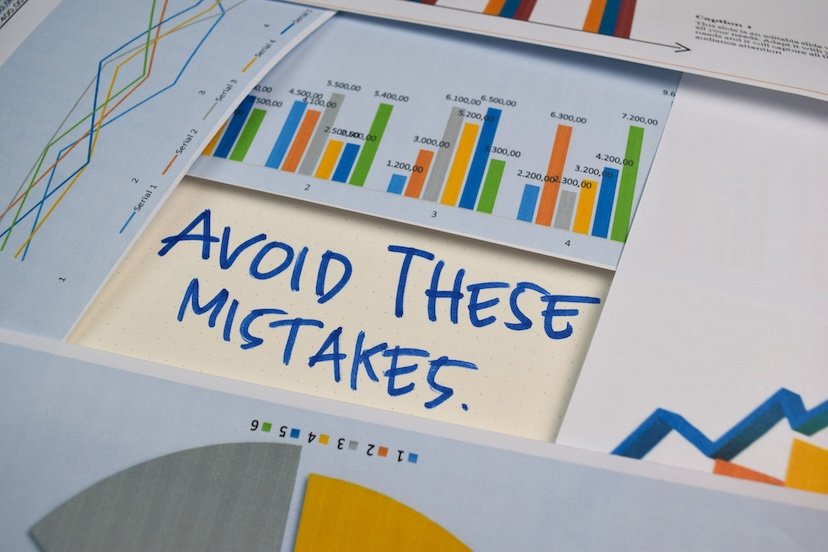If you’re one of the many people who intended this would be the year to get your finances in order, how’s that going? Hopefully, this will help. We’re going to highlight 10 of the most common money mistakes people make and, more importantly, suggest a few quick ways to avoid them.
Mistake 1: Living Beyond Your Means
One of the biggest mistakes people make is living beyond their means. Over and above essential spending—such as rent/mortgage, food, and domestic bills—there are countless non-essential expenses that creep in. Regularly overspending on these non-essentials can lead to financial instability. Credit cards and Buy Now Pay Later (BNPL) schemes exacerbate this, allowing you to spend money you don’t have.
Solution: Create a realistic budget to know what you can and can’t afford. Stick to it, even when pressured by friends, family, or tempting marketing tactics. Learn to say “no” to unnecessary expenses.
Mistake 2: Not Having a Monthly Budget
Failing to create and follow a monthly budget leaves many people unsure of where their money goes. Without budgeting, small financial leaks can snowball into big problems.
Solution: Document all income and expenses, whether you prefer pen and paper, spreadsheets, or budgeting apps. Regularly review your budget and spending to ensure alignment with your financial goals.
Mistake 3: Not Keeping Track of Direct Debits
Direct debits make bill payments convenient but can lead to overspending if unchecked. Many subscriptions auto-renew and increase rates unnoticed.
Solution: Check your bank statements for unnecessary or forgotten subscriptions. Cancel any that you no longer need. Before signing up for anything, read the fine print to avoid the ‘subscription trap.’
Mistake 4: Staying Loyal to Suppliers
Many people overpay for services like broadband, insurance, and energy by not shopping around when contracts end.
Solution: Contact your current provider for a better deal or use comparison websites like Compare the Market, uSwitch, or Money Supermarket to find more competitive offers. Switching providers can save hundreds annually.
Mistake 5: Not Having Savings
Financial experts recommend having savings to cover at least three months’ living expenses, yet many people have little to no savings.
Solution: Start small but start now. Open a savings account separate from your main bank account and set up a direct debit to deposit a fixed amount monthly. Even small, regular contributions build up over time.
Mistake 6: Leaving Money in Low-Interest Accounts
With interest rates on the rise, many people miss out by keeping savings in low-interest accounts.
Solution: Research accounts offering competitive interest rates (5% or higher as of mid-2024). Opt for accounts that allow penalty-free withdrawals for emergencies while earning decent returns.
Mistake 7: Ignoring Pension Contributions
Failing to maximize pension contributions early can lead to financial strain in retirement.
Solution: If you’re employed, ensure you’re enrolled in your workplace pension scheme. Consider making additional contributions to benefit from tax relief and employer matching. If you’re self-employed, explore private pension options and take advantage of tax-deductible contributions.
Mistake 8: Making Only Minimum Payments on Credit Cards
Paying only the minimum on credit card balances leads to high interest and prolonged debt.
Solution: Pay off as much of your credit card balance as possible each month. If you have multiple cards, focus on clearing the one with the highest interest rate first.
Mistake 9: Not Checking Your Credit Report
Errors on your credit report can lead to higher interest rates or declined credit applications.
Solution: Regularly review your credit report through agencies like Experian, TransUnion, or Equifax. Ensure all information is accurate and dispute any errors. Also, sever financial links with anyone whose poor credit could affect yours.
Mistake 10: Paying Too Much Tax
Many people overpay taxes due to unawareness of their entitlements or errors in their tax codes.
Solution: Check your HMRC tax code to ensure it’s accurate. If self-employed, claim eligible business expenses like travel and home office costs. If married, consider applying for the Marriage Allowance to transfer unused Personal Allowance to your spouse.
Final Thoughts
As Benjamin Franklin wisely said: “An investment in knowledge pays the best interest.”
Take charge of your finances today. Avoid these common mistakes and pave the way for a secure financial future.
Join Our WhatsApp Channel
Stay updated on the latest UK news, including education, health, job openings, and more for those living in the UK!
Join here: Naija UK Channel
Also, follow us on our social media channels for the latest updates and discussions:
- Twitter: @NaijaUKConnect
- Facebook: Naija UK Connect
- Instagram: @naijaukconnect




